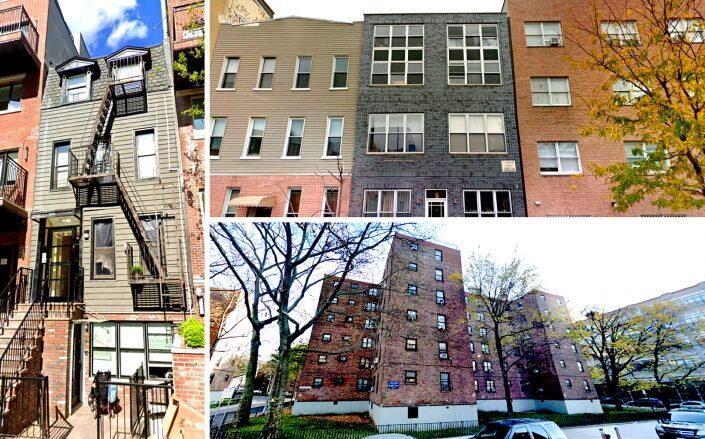For the past year, All Year Holdings’ massive Brooklyn real estate empire has been hanging by a thread as debt woes, threats of foreclosures, and allegations of fraud plague its founder Yoel Goldman.
In August, some of the Israeli bondholders who control the company’s debt found an escape route. They solicited bids for the company’s bonds and appeared to strike a deal with Josh Gotlib’s Black Spruce Management.
If it is approved, Black Spruce would restructure the bonds and take control of 125 All Year properties with the notable exception of the Denizen apartments in Bushwick and the swanky William Vale hotel in Williamsburg.
But like everything with All Year Holdings, nothing is simple.

Clockwise from left: 273 Skillman Street, 1358 DeKalb Avenue and 83 Nostrand Avenue (Google Maps)
A joint venture between Andrew Farkas’s Island Capital and Mark Jesselson’s Jesselson Capital, which was part of the original bidding process, made another offer to bondholders in October.
Black Spruce cried foul and filed a lawsuit Nov. 17, claiming the bondholders and All Year were not supposed to solicit new offers.
Black Spruce alleged that it had an exclusivity period to negotiate its offer and that All Year and Israeli bondholders were breaching their contract, according to the lawsuit. It sought a temporary restraining order to prevent the bondholders and All Year from voting on the offer. But on Nov. 23, a New York Supreme Court judge denied that request.
Black Spruce withdrew its lawsuit, signaling an end to its quest to acquire hundreds of millions of dollars of Brooklyn real estate, including properties at 283 Nostrand Avenue, 273 Skillman Street, 1358 DeKalb Avenue, 311 Melrose Street and 1055 Dean Street. That gives bondholders a chance to cash in after All Year’s bonds tanked 40 percent last year.
All Year Holdings became one of Brooklyn’s largest real estate companies in recent years after it tapped the Israeli bond market for cheap financing. The firm was spearheaded by Goldman, a Hasidic Jewish developer who also oversaw All Year Management, a property management firm in Brooklyn.
Goldman’s portfolio included stakes in the William Vale hotel and the Denizen complex favored by tech bros. Since 2019, the company’s portfolio has become entangled in a web of lawsuits and dizzying agreements with partners and investors. Goldman was ousted from the company after the All Year Holdings missed bond payments in late 2020.
The company’s debt totals $1.5 billion. It is dealing with more than 20 lenders and 20 partners, according to a filing by its associate chief restructuring officer.
Much of All Year’s future rests in the hands of Israeli bondholders. Finding a common consensus among bondholders about the best path forward has not been easy. Black Spruce and Island Capital’s proposals shed light on why.
Both firms were offering an all-cash option as well as an equity option in exchange for their bonds. Both would restructure All Year’s outstanding debt, work to resolve all litigation, and secure a stable cash flow. And both would give the two companies all of the outstanding equity.
The key difference is that Island Capital offered bondholders and the company more money. For example, with the equity option, Black Spruce would make a preferred equity contribution of $30 million, while Island Capital planned to inject $45 million into the company. The money was going to be used to repay bondholders. Boiled down, Island Capital’s offer would pay bondholders $30 million compared to Black Spruce’s $20 million, according to a filing on the Tel Aviv Stock Exchange.
All Year Holdings’ position in the William Vale is also at risk. Israeli bondholders recently agreed to proceed with a proposal by Monarch Alternative Capital and Richard Wagman’s Madison Capital to purchase their debt.
Black Spruce and Island Capital declined to comment. All Year Holdings’ chief restructuring officer did not return a request for comment.
